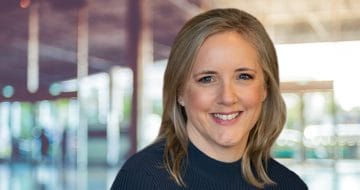Legal Cheek‘s annual conference gathered together key figures from across the profession to discuss lawfluencers, AI, SQE and more
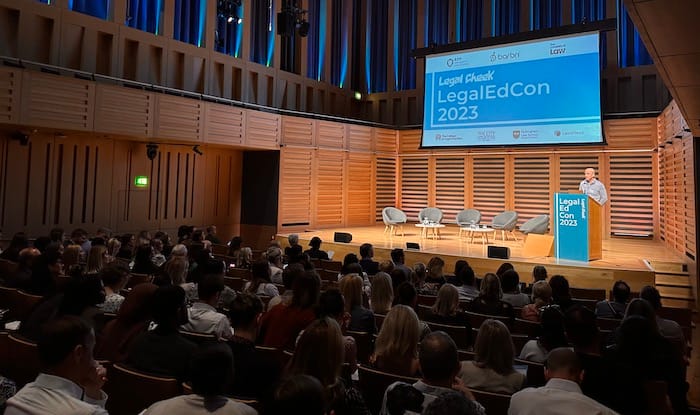
LegalEdCon 2023 returned to Kings Place in London yesterday with a host of talks exploring the hottest topics in legal education and training.
As the day of the conference arrived, 250 delegates came together to hear the latest ideas from experts at the forefront of the legal industry. This year’s conference featured sessions covering topics including the Solicitors Qualifying Exam (SQE), perspectives from lawfluencers, innovation, the role of universities in legal education as well as a session focusing on training at the bar.
The keynote session, this year focused on solicitor apprenticeships, offered attendees unique insights into one of the fastest-growing routes into law. The session was delivered by a group of speakers with different perspectives on solicitor apprenticeships ranging from those committed to building the pathway to those inspired to pursue it.
This year’s conference also coincided with launch of our Student Perceptions Report 2023, an in-depth 40-page print report based on our survey of 2,000 students who aspire to become solicitors.
Session 1: What we can learn from lawfluencers

The speakers:
• Amelia Platton, Magic Circle trainee solicitor and founder of The Neurodiverse Lawyer Project
• Maab Saifeldin, in-house trainee solicitor and career content creator (Life with Maab)
• Maia Crockford, solicitor apprentice and legal influencer with over 50k followers on TikTok (My Legal Career)
• Henry Nelson-Case, consultant solicitor and content creator with over 67k followers on TikTok (thatcorporatelawyer)
In the first session, four of the biggest lawfluencers shared their insights on what it looks like to be a lawyer today. Their openness and honesty on issues like mental health highlighted how far the profession has progressed when it comes to having these challenging conversations.
Consultant solicitor and content creator, Henry Nelson-Case, opened the session. Known as @thatcorporatelawyer on TikTok, Nelson-Case started his account after finding comfort in relatable social media content during the pandemic. He spoke candidly on how workplace stress hasn’t been properly addressed for its impact on lawyers’ mental health for a long time. His key message was that good mental health and law shouldn’t be mutually exclusive.
Next up, Amelia Platton, Magic Circle trainee solicitor and founder of The Neurodiverse Lawyer Project discussed the balancing act that is mental health and professionalism on social media. She explained that the project was born out of frustration at a lack of neurodiverse representation in the industry and she wanted to increase understanding around autism and other neurodiversity issues.
Maab Saifeldin, in-house trainee solicitor and career content creator, told us about her decision to document her life as a Black Muslim woman in law. Saifeldin explained that, as a refugee who came to the UK from Sudan in 2007, she found having to take the first steps into law by herself isolating and lonely, but her account led her to find community and resources. Speaking about sharing her experiences with her online community she said: “Our vulnerability not only humanises us but it humanises the profession.”
Finally, Maia Crockford, solicitor apprentice at DAC Beachcroft delivered a talk aimed at challenging the negative views around lawfluencers. She said that when it comes to lawfluencers, negativity has already had enough airtime and we need to focus instead on what these accounts can offer their communities and the role they play in inspiring young people and others to take control of their careers.
Session 2: Meet the legal training innovators
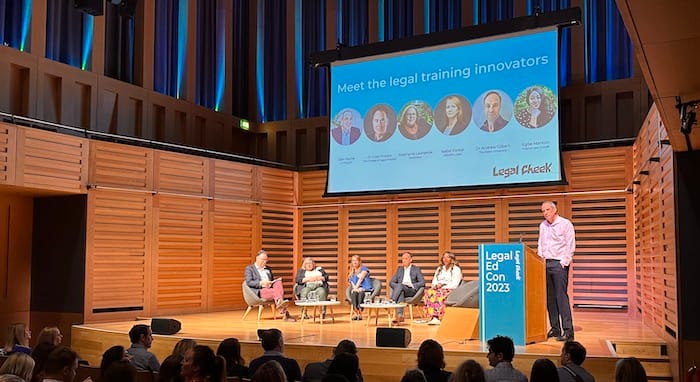
The speakers:
Giles Proctor, CEO at The College of Legal Practice
Stephanie Lawrence, senior product manager at LexisNexis
Isabel Parker, partner at Deloitte Legal
Egbe Manton, counsel at BP and founder of Inspire Law Global
Dr Andrew Gilbert, senior lecturer in law at The Open University
Dan Kayne, lawyer and founder of O Shaped
Dan Kayne, lawyer and founder of O Shaped chaired the session on legal training innovation. Giles Proctor, CEO at The College of Legal Practice, kicked off the session by talking about driving innovation through collaboration. He said the industry needs to recognise that new lawyers coming through the SQE route will be different to those that came before and legal education must identify and bridge the gaps created.
Stephanie Lawrence, senior product manager at LexisNexis then spoke about what AI means for the legal profession’s future. She was excited for how AI will likely change the way lawyers work, citing benefits to both productivity and efficiency. She urged the profession to embrace these technological advancements, dubbing it a “once in a generation opportunity”.
In the next talk, Isabel Parker, partner at Deloitte Legal, asked us to consider what the lawyer of the future will look like and what it will take for us to adapt. She said legal educators must prepare the lawyers of the future, with wider business knowledge and more human skills.
Dr Andrew Gilbert, senior lecturer in law at The Open University, dug into some data to highlight the ways that generative AI tools like ChatGPT are changing the industry. He suggested that while the media is awash with stories of ChatGPT cheating, students are more likely to be employing the tool for data collection and quick summaries.
Egbe Manton, counsel at BP and founder of Inspire Law Global brought the session to a close by rethinking how firms find early talent. She talked about ‘gamifying’ legal training for the younger generation, encouraging them to reach new levels and unlock rewards.
Lunch and networking
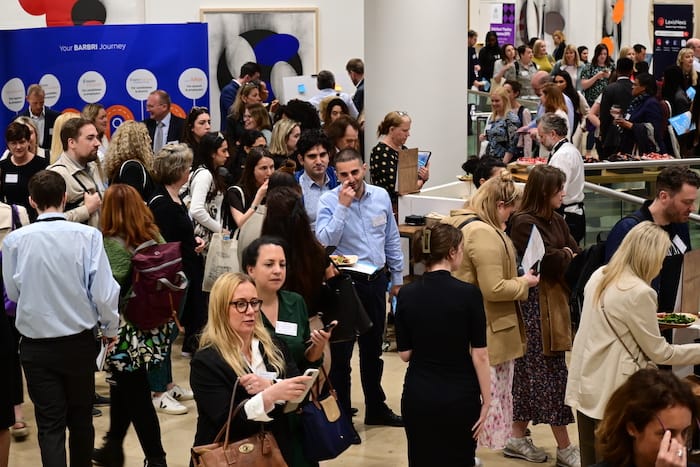
Session 3a: The SQE explored

The speakers:
• Caroline Lister, head of consortium programmes at BPP University Law School
• Victoria Cromwell, head of new business & account management at BARBRI (joined on stage by Lisa Hart Shepherd, CEO at Lamp House Strategy)
• Jill Howell-Williams, SQE national programme and student affairs director at The University of Law
• Rebecca Schrod, graduate recruitment manager at Reed Smith
• Nicola Willden , senior early talent manager at Taylor Wessing
• Dimitri Vastardis , senior development manager at Osborne Clarke
After lunch and networking, it was time for the SQE explored session. Victoria Cromwell, head of new business & account management at BARBRI and Lisa Hart Shepherd, CEO at Lamp House Strategy took to the stage together to outline three big trends currently shaping the legal market (technology, talent demand and client needs) and how educators can meet these trends and create systemic change.
Caroline Lister, head of consortium programmes at BPP University Law School spoke about the opportunities brought by the SQE, citing the growth of legal apprenticeships, and the flexibility of qualifying work experience as the key benefits of the change.
Next, Jill Howell-Williams, SQE national programme and student affairs director at The University of Law took us beyond the SQE to think about developing the next generation of lawyers. She highlighted the importance of helping students build the skills and aptitudes that they need to succeed in everyday practice such as communication and commercial awareness.
For the Q&A session, our speakers were joined by Rebecca Schrod, graduate recruitment manager at Reed Smith, Nicola Willden, senior early talent manager at Taylor Wessing and Dimitri Vastardis, senior development manager at Osborne Clarke.
Session 3b: The future of the bar

The speakers:
• Mark Keith, director of programmes at BPP University Law School
• Beverley Dawes, head of BPC at The University of Law
• Simone Start, BVS programme director at The City Law School
• Mark Neale, director-general at the Bar Standards Board
• Colleen Cumbers, future pupil barrister at Crown Office Chambers
• Konstantina Nouka, chair and founder at Bringing [Dis]Ability to the Bar
Mark Keith, director of programmes at BPP University Law School, kicked off LegalEdCon’s bar session by looking at what impact chatbots such as ChatGPT could potentially have on barrister training. He told the audience that law schools will likely have to adapt their approach to assessments. Keith went on to warn that AI bots, as things stand, are far from perfect.
Beverley Dawes, head of BPC at The University of Law, explained how the law school is attempting to bring greater flexibility to bar training — both in terms of study modes and locations. She also flagged the additional support it provides to those seeking pupillage, including CV workshops, application guidance and help securing work experience opportunities.
Meanwhile, Simone Start, BVS programme director at The City Law School, discussed what the future holds for exam proctoring in light of the recent news that online exams will be banned later this summer amid allegations of “malpractice” by students overseas.
The Bar Standards Board’s director-general Mark Neale looked at what impact changes to the bar training rules have had two years on. He noted good progress in terms of flexibility in course options and reduction in fees. But Neale did accept more work is still do, particularly in addressing pupillage success rates among Black aspiring barristers.
Elsewhere, Colleen Cumbers, future pupil barrister, and Konstantina Nouka, chair and founder at Bringing [Dis]Ability to the Bar, reflected on their experiences of pursuing pupillage. Cumbers told the audience that students need to be better informed about their chances of success, while Nouka explained how the vast majority of chambers she received interview offers from were not wheelchair accessible.
Session 4: Legal training and the role of universities
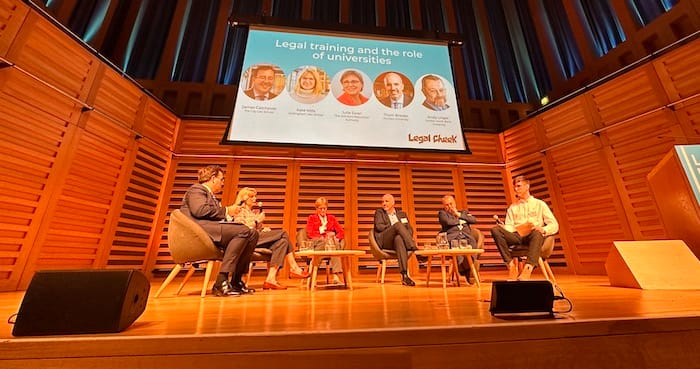
The speakers:
• James Catchpole, head of department for postgraduate and professional programmes at The City Law School
• Kate Mills, principal lecturer and LPC and SQE course manager at Nottingham Law School
• Julie Swan, director of education and training at the Solicitors Regulation Authority
• Thom Brooks, professor of law and government at Durham University
• Andy Unger, head of the law department at London South Bank University
After a final chance for caffeine and networking, we rolled into the last two sessions of the day. The first of these was a look at current legal training trends and academia. James Catchpole, head of department for postgraduate and professional programmes at The City Law School told us what embracing the SQE has meant for its students, with an honest appraisal of the challenges they have encountered along the way.
Kate Mills, principal lecturer and LPC and SQE course manager at Nottingham Law School followed this with a talk guiding us through the maze of available options on the SQE preparation market. She advised students to do their research, think about what matters to them and look for courses with added value.
We then heard from Julie Swan, director of education and training at the Solicitors Regulation Authority, who reminded the audience that the SQE was first devised to democratise legal training and considered what its future looks like.
Thom Brooks, professor of law and government at Durham University took a very critical look at the SQE, comparing its introduction to Brexit. Durham law school, among others, has made the decision not to adopt it into their syllabus.
Finally, Andy Unger, head of the law department at London South Bank University confessed to being an SQE sceptic but told the audience how his university had created an SQE-LLM which hopes to prepare future lawyers to qualify while still offering them something extra academically.
Keynote on solicitor apprenticeships
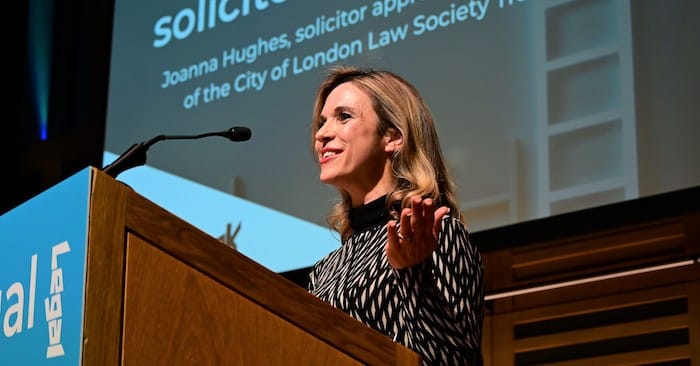
The speakers:
• Joanna Hughes, solicitor apprenticeship expert and member of the City of London Law Society Training Committee
• Patrick McCann, chair of the City of London Law Society Training Committee and director of learning at Linklaters
• Logan Mair, partner at Ashurst and former co-managing partner.
• Eniola Adekunle, year 12 student and aspiring solicitor apprentice
• Shakeel Khan, year 12 student and aspiring solicitor apprentice
The day culminated in a keynote session opened by Joanna Hughes, solicitor apprenticeship expert and City of London Law Society Training Committee member. She explored the growing world of solicitor apprenticeships and highlighted the work of City Century, a ground-breaking collaboration of 50 law firms committed to furthering this pathway into the profession.
After Hughes outlined the economic and business case for solicitor apprenticeships, we moved to a panel discussion with Patrick McCann, chair of the City of London Law Society Training Committee and director of learning at Linklaters, Logan Mair, partner at Ashurst and year 12 students and aspiring solicitor apprentices Eniola Adekunle and Shakeel Khan.

Alex Aldridge, Legal Cheek‘s publisher, brought the conference to a close, thanking the speakers, delegates and headline sponsors BARBRI, BPP University Law School and The University of Law, as well as silver sponsors LexisNexis, The City Law School, The College of Legal Practice, Nottingham Law School and partner charity The Food Chain.
For details about how to get a copy of The Legal Cheek Student Perceptions Report 2023, please contact team@legalcheek.com

